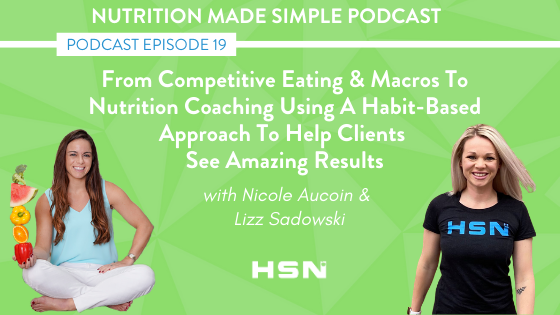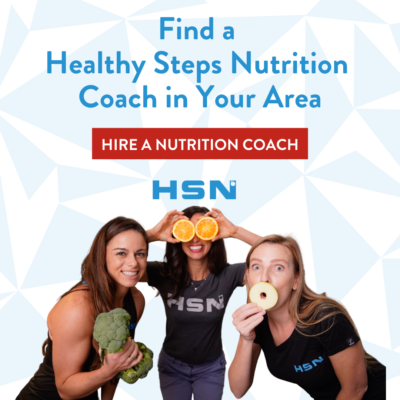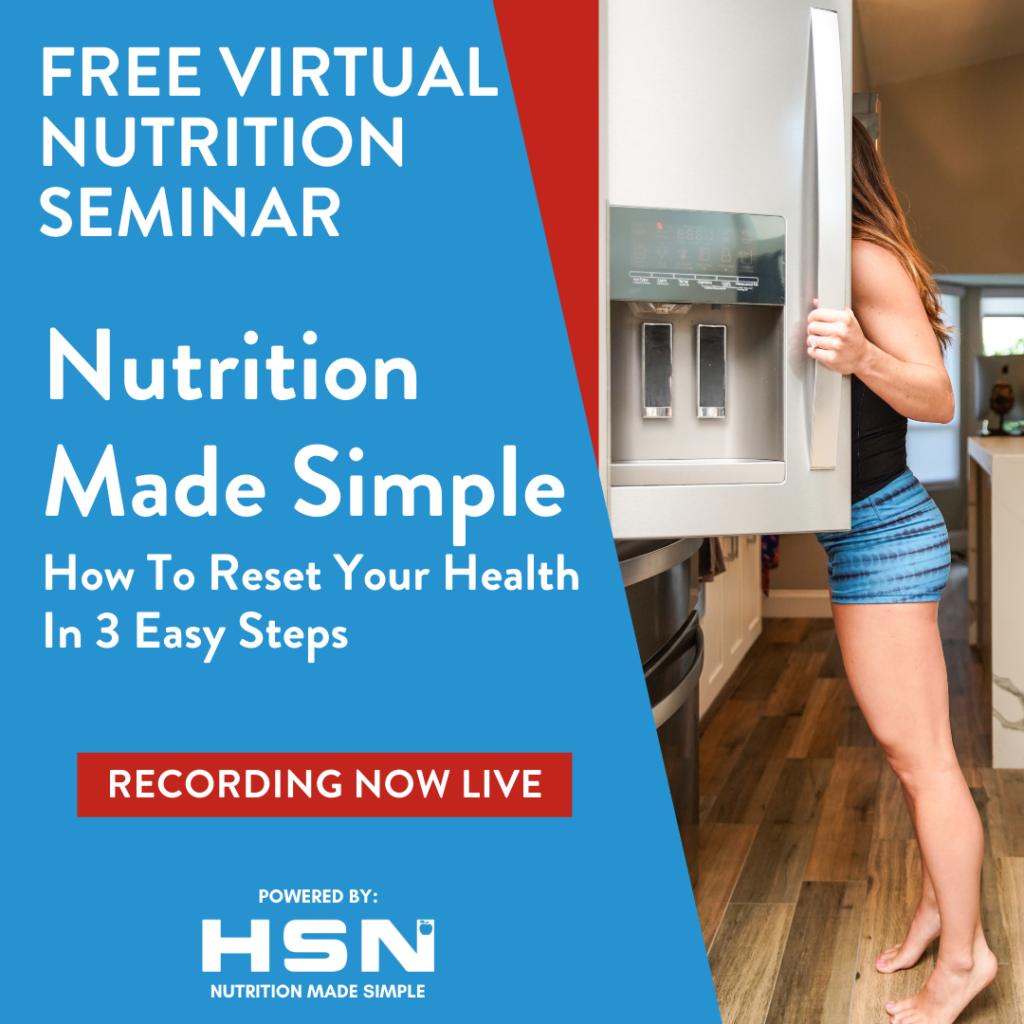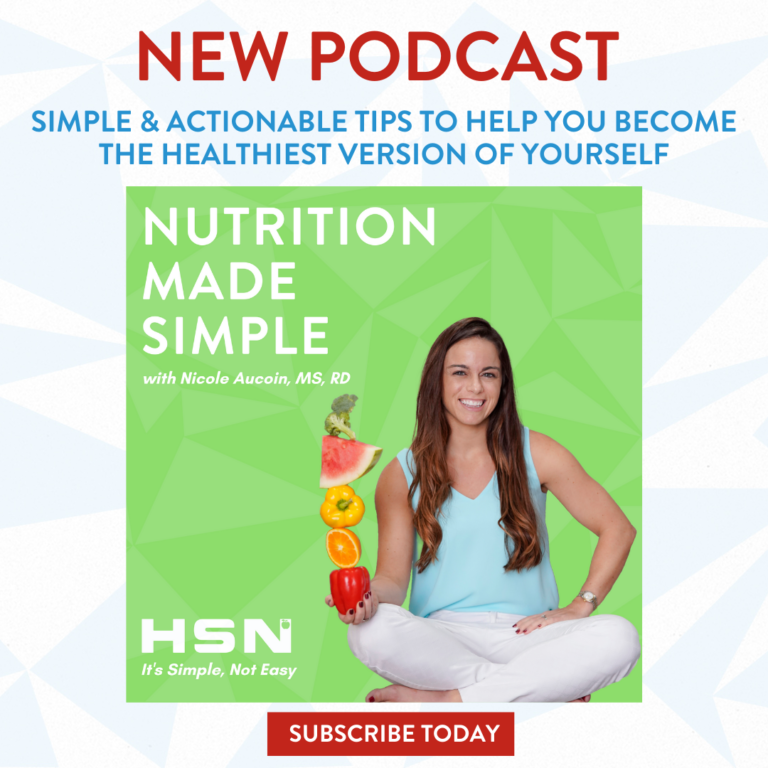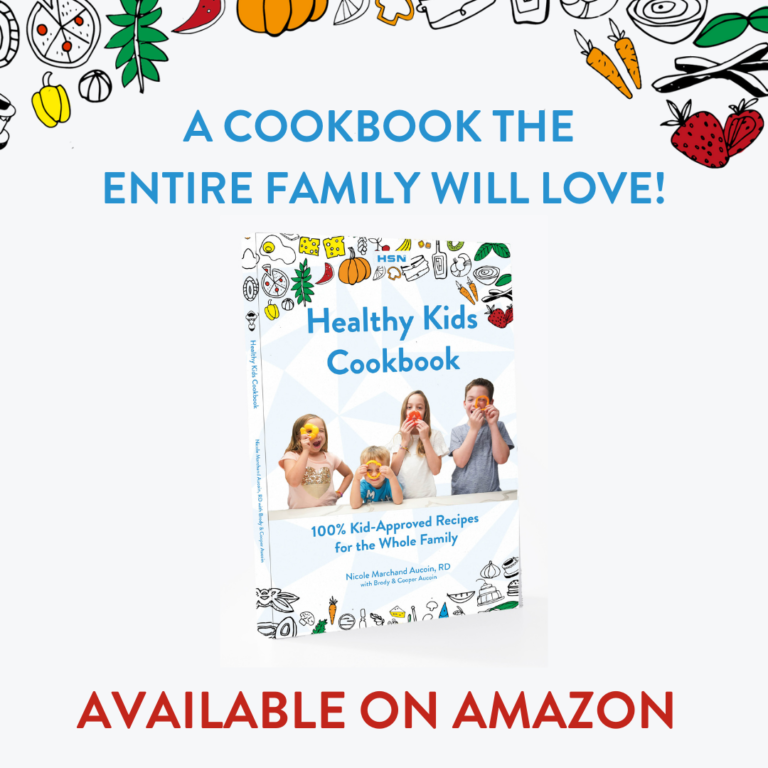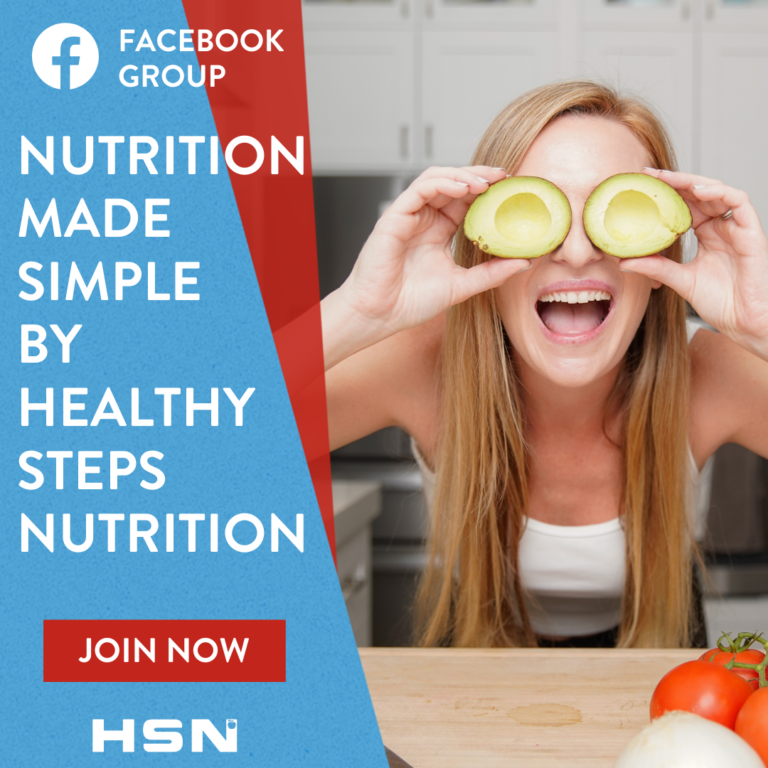Some of the best nutrition clients have lost their own transformation. They are passionate about nutrition and helping others and are able to combine those two things when becoming a nutrition coach.
Today’s guest on the podcast is Lizz Sadowski. She is one of the Healthy Steps Nutrition Headquarters nutrition coaches as well as a mentor for HSN Mentoring, where she helps other nutrition coaches use our platform to help their clients.
In this podcast, we discuss:
- Her Journey with nutrition
- Why she stopped competitive eating and started focusing on quality nutrition
- Her journey from macros to habit-based coaching
- Top mistakes nutrition clients make
- Best advice to someone listening to get started with nutrition
Please don’t forget to rate, leave a review and subscribe to this podcast!
Topics Discussed In This Episode
Lizz's journey with nutrition
Growing up, Lizz was very interested in food – cooking and reading about food were her favorite past times. After college, Lizz decided to dial in her nutrition. This led her to 15 years of following FAD diets and fluctuating in weight before finding macros and ultimately, habit-based nutrition. Which she continues to follow and teaches her clients today.
Why she stopped competitive eating and started focusing on quality nutrition
As a competitive eater with wings as her specialty, Lizz found comfort in excelling at competitive eating and the satisfaction after each contest. This comfort of competitive eating and eating a large amount of food in a short amount of time, moved into her everyday life. After finding out she had a gluten allergy, she stopped competitive eating and started macro counting.
Her journey from macros to habit-based coaching
While strict macro counting, Lizz lived by her MyFitnessPal App and her food scale, she wouldn’t eat a meal without weighing her food. After doing this for 3 years and being on a 700 day streak in MyFitnessPal, she realized this wasn’t a way of life she wanted to live with strict macro counting. She ultimately started gaining weight while macro counting. Around this time Lizz started to transition into a nutrition coach at the gym she worked at and this is how she found the Healthy Steps Nutrition habit-based coaching.
Top mistakes nutrition clients make
The top 2 mistakes that Lizz’s sees her clients make:
Clients wanting to do too much, all at once and not focusing at one step a time.
A client wanting her to tell them exactly what to do.
Best advice to someone listening to get started with nutrition
Give yourself grace and patience. Pause for 10 seconds before you eat, observe what you are eating and why you are eating. Ask yourself how am I feeling? Am I actually hungry? Am I stressed? Am I tired?
Even if you don’t change your behavior that day, just sit with it and learn about your behavior and that mindfulness can go a long way in the future.
ADDITIONAL PODCAST EPISODES TO LISTEN TO
ARE YOU A GYM OWNER OR NUTRITION COACH?
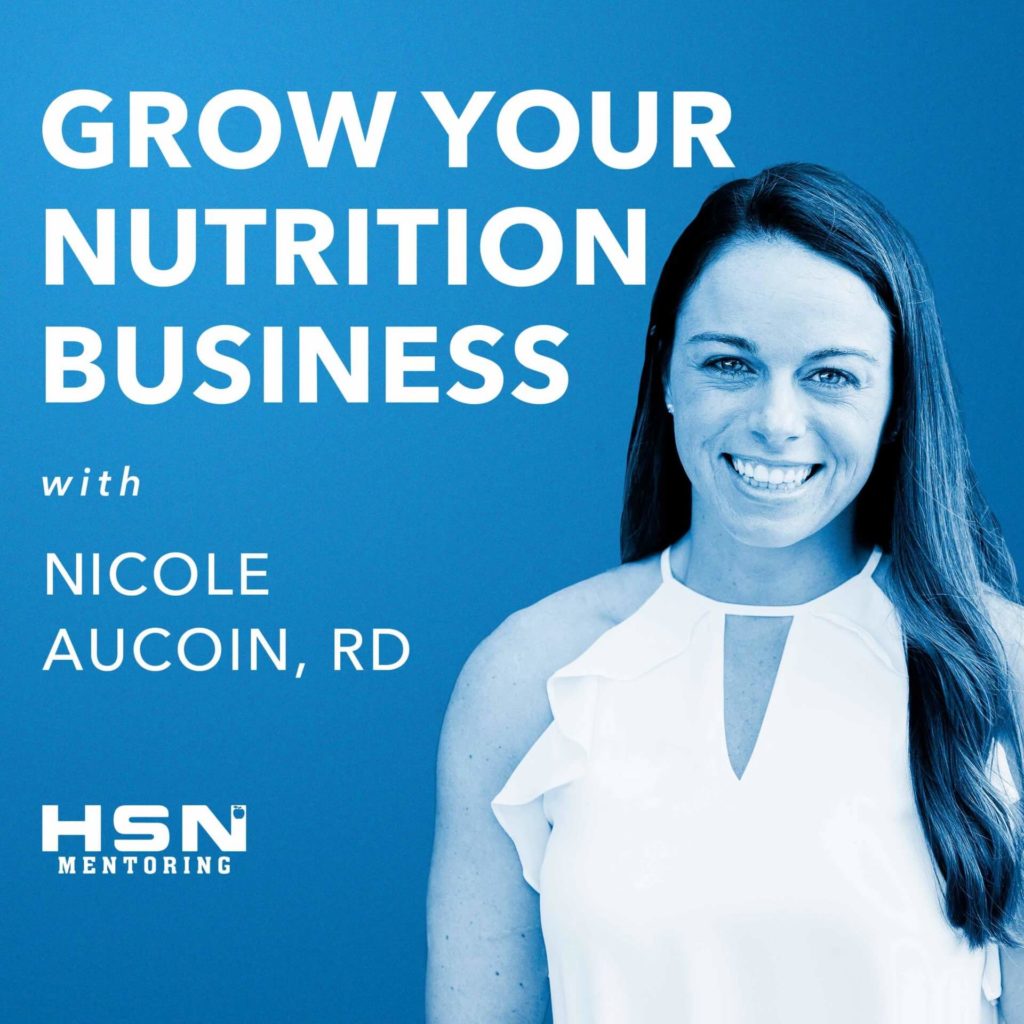
You don’t want to miss the Grow Your Nutrition Business Podcast!
Every week, we provide simple and actionable tips to help gym owners and coaches build a wildly successful nutrition program.
Listen now!
INTRODUCING HIREANUTRITIONCOACH.COM
In this directory, you will find a list of the nutrition coaches and dietitians that use our program, written and overseen by dietitians.
These coaches have gone through coaches evaluations, have ongoing mentoring calls with our experts, and have been nutrition coaching using HSN for a minimum of four months.
Click the link below to find a nutrition coach near you!
Episode Transcript:
Nicole Aucoin (00:04):
Welcome to the Nutrition Made Simple podcast. At Healthy Steps Nutrition, we believe something as fundamental as nutrition shouldn’t be complicated, which is why we focus on a simple, habit based approach when working with clients. I’m your host, Nicole Aucoin, registered dietitian and founder of Healthy Steps Nutrition, CrossFit HSN and HSN Mentoring. I’m also the author of The Healthy Kids Cookbook: 100% Kid Approved Recipes the Entire Family Will Love. In this podcast, we will be teaching you how to take one step at a time to becoming the healthiest version of yourself.
Nicole Aucoin (00:45):
Today, I am so excited to bring on one of the members of our team, Lizz. Some of the best nutrition coaches have been through their own transformation themselves. They are passionate about nutrition and passionate about helping other people. And they’re able to combine those two things when becoming a nutrition coach. Today, Lizz is one of the Healthy Steps Nutrition headquarters’ nutrition coaches and she is also on the mentoring team so she helps other nutrition coaches running our program, implement the nutrition program to help more people around the world become the healthiest version of themselves.
Nicole Aucoin (01:25):
Today, you are going to hear so many different curve balls. Lizz has such an interesting story. We talk about her journey with nutrition, why she stopped competitive eating and started focusing on quality nutrition and intuitive eating, polar opposites when you think about the nutrition spectrum. We also talk about how she started doing habit based nutrition coaching and some of the top mistakes she sees that nutrition clients make and some of her best advice for people listening to this podcast. We will get to this podcast right after this message.
Nicole Aucoin (02:08):
Do you know someone who’s looking to get healthy but is unsure where to start? We would love for you to share this podcast with them. You never know who could use some words of encouragement. Take a screenshot of this podcast and post it on social media. Please don’t forget to tag @healthystepsnutrition on Instagram so your friends can find us and all the free help that we provide on our social media on a regular basis. Also, don’t forget to click the link in the show notes because there’s always additional support and resources and free downloadable guides when you do that. Enjoy this episode with Lizz.
Nicole Aucoin (02:48):
Lizz, welcome to the Nutrition Made Simple podcast.
Lizz Sadowski (02:52):
Thank you so much for having me. I’m so excited.
Nicole Aucoin (02:55):
I’m so excited. You have been a part of the HSN family for a while as a coach and then you came on board as a mentor last year, and then you came on board as a nutrition coach at our HQ location. All of the journey with us, but I want to backtrack. What started your passion for nutrition? Let’s talk about your journey with nutrition first.
Lizz Sadowski (03:16):
Oh gosh. It’s a long one. I would say probably I can remember being into nutrition pretty much for as long as I can remember only because I was super obsessed with food when I was little. I loved it. I loved cooking. I loved reading about food. My mom would give me menus when I was sick, to read. That was like my pastime, how I spent the time was just reading about food. I never really thought about how it really played a part in my health through college, typical college eating. And then I remember the very first time I stepped on a scale post-college, I was working in the ER night shift and I stepped on the scale and I went, “Whoa, what is this number? It can’t be right.” That was the very first time I ever tried to take a look at what my nutrition and how it was playing a role in my health. That also led me to my very first fad diet.
Nicole Aucoin (04:11):
I think all of us have been on a fad diet before. I think the average American tries four fad diets per year.
Lizz Sadowski (04:18):
I was probably there. I should’ve worn some sort of crown of fad diet queen of everything. And it was honestly 15 years of up and down fad diets, up and down weight. I tried everything. And if I was trying something new, you knew about it because I was one of those people who talked about it non-stop. Oh, you should see me. I’m doing intermittent fasting. Oh, you should see me, I’m doing this new shake, detox, pills. I tried it all and it was to no avail. I literally went up and down the same 15 pounds of weight for 15 years.
Nicole Aucoin (04:55):
And I can only imagine how frustrating that was for you.
Lizz Sadowski (05:00):
It was. It was really frustrating and the more out of control my weight got, the tighter the reins I pulled on my nutrition and the more restrictive I became and at the same time, so this is going to sound a little crazy coming from a nutrition coach. I got into the world of competitive eating.
Nicole Aucoin (05:23):
Competitive eating.
Lizz Sadowski (05:25):
Yes. Wings were my specialty. I would eat as much as I could as quickly as possible and I was really good at it. And that became my thing. And people knew me as that little girl who could eat a whole lot.
Nicole Aucoin (05:42):
Wow.
Lizz Sadowski (05:44):
Yeah, most people are very surprised when I tell them that.
Nicole Aucoin (05:50):
Okay, I want to ask you a question about this, because this is the first time I’m hearing about this and you’ve worked for us for quite some time. How did you feel after competitively eating a ton of wings at one time?
Lizz Sadowski (06:03):
I took an odd comfort into that overstuffed feeling because I got all of this attention from it, which is what I’m realizing, what led me to it. Everyone was like, “Oh my goodness, how can you eat so much and be not 300 pounds?” And I’m like, “Yeah, look at me. I’m just eating all this food and not paying attention.” I started to find comfort in that overstuffed feeling that I would get after I would compete. That led me to doing it in my normal day to day life as well.
Nicole Aucoin (06:38):
Well of course. If you find comfort in something, it’s going to translate into every single day. Okay.
Lizz Sadowski (06:46):
Of course.
Nicole Aucoin (06:47):
Then what happened? How did you get out of competitive eating?
Lizz Sadowski (06:51):
Thankfully, oh gosh, this sounds so silly to say out loud, I was wanting to train for the 4th of July hot dog eating contest. And I say train because you can train for it. And thankfully I found out that I was allergic to gluten. Thank goodness, because that was what put a hard stop that I couldn’t do this to myself anymore. That’s how I retired from competitive eating.
Nicole Aucoin (07:21):
Retired.
Lizz Sadowski (07:22):
Retired.
Nicole Aucoin (07:23):
Okay. Okay.
Lizz Sadowski (07:26):
I know this is taking a turn you weren’t expecting.
Nicole Aucoin (07:30):
1,000%. You find out you’re allergic to gluten and then you’re like, okay, I need to start eating healthier. Let me do a little bit more research. I assume is where we’re going.
Lizz Sadowski (07:41):
Right. Right. And that landed me on macro counting. And this is where I lived for about three years. At the same time, mind you, I was still working in healthcare. I was working in the OR at the time doing pediatric cardiac surgery. Super high stress environment, unpredictable hours. I was still eating as much as I could in small timeframes because I didn’t know when I was going to get to eat again. For about three years, I lived and breathed by MyFitnessPal and my food scale. It came everywhere with me.
Nicole Aucoin (08:17):
And I bet honestly, that was probably a little bit stressful for you. If you’re bringing it everywhere with you, how can you really live your day to day life if you’re so worried about counting a specific macro?
Lizz Sadowski (08:32):
Exactly. And I look back and I’m like, oh I was so sad. I would take individual food items off of my plate at a restaurant and put it on this little bitty food scale. And if it fit in my macros, I was good. And it didn’t matter what it was. And I remember the day I had a 700 plus day streak on MyFitnessPal going and I so great about that and I was on vacation and I missed a day and my streak ended and I cried. I’m like, what am I doing to myself? What kind of life is this? And at the same time, my weight was creeping up little by little. I wasn’t losing any weight. I was continuing to gain slowly and I didn’t understand because I was hitting my macros and the more weight I gained, the tighter of a hold I got on my numbers and the more strict I got with myself and I kept gaining weight.
Nicole Aucoin (09:28):
I’m sure that the stress of doing all of that, wasn’t helping at all. And it’s interesting, there’s a lot of people that come to us from counting macros and for 99% of the population, it’s too stressful. You need something that’s simple, you need something that’s sustainable, hitting your macros is not going to necessarily help you feel optimal. Not every macro is created equal. Yes, carbohydrates, something might have 20 grams of carbs and another food might have 20 grams of carbs but inside that food could be completely different. And most people don’t understand that, that are counting macros are like, okay, I’ve met my fat goal. I’ve met my protein goal. I’ve met my carb goal and I’m good. It’s interesting because when people ask me, “Nicole, what are the macros? What are my macros?”
Nicole Aucoin (10:19):
And I’m like, “Do you know what a macro is?” And then I sit there and I just am quiet. And most people have no idea what a macro nutrient is. And for everyone listening, I’m going to explain it to you really simply. Macro nutrients are the nutrients that provide us calories. We have carbohydrates, proteins and fats. Carbohydrates is probably the biggest umbrella, but there’s a lot of foods that have multiple different macronutrients in them and that’s where people get really frustrated because they think, okay, I’m having steak and that’s protein, but really depending on what kind of steak you have, you could have a lot of fat in that steak and then go way over, right?
Lizz Sadowski (10:56):
Exactly. Exactly.
Nicole Aucoin (10:58):
I think there’s definitely a place. One of our neighbors actually, she’s been struggling with weight. She didn’t want to hire a nutrition coach. And I was like, you know what? Why don’t you just log your food for a couple days and just see where you’re at? Understand and I think that’s a great analysis for someone that wants a do it yourself version. Most people have no idea what they’re consuming throughout the day. Have a self assessment and then from there, get away from that and move to something that’s a little bit more sustainable.
Lizz Sadowski (11:24):
Exactly. But it’s comforting as well though, because you’re relying on this very strict set of food rules. And it’s almost externalizing your behavior around food, because if something doesn’t go right, it’s not your fault, it’s the macro’s fault. It doesn’t make you look within to see how you are actually playing a role in your day to day nutrition habits.
Nicole Aucoin (11:51):
Yeah. You’re right. Okay. You have the 700 day streak and then you miss this day, you’re like, oh my gosh, what am I doing right now? And then where did your journey take you then?
Lizz Sadowski (12:05):
Thankfully, because I talked about food all of the time, my owner of the gym I was working at, reached out and asked me to become a nutrition coach. Enter Healthy Steps Nutrition into my life. At the time when I went through the coaches’ training, I was still hardcore macros. Food logging, that was it. That was the answer to everything. And I started working with clients. And if any of my first few clients are listening, I’m sorry for what I did to you because I still believed at the time macros were everything. But then the more I learned from the program and from you all, the more I realized it wasn’t the answer. That was my wake up call that I needed to do some more research into the right ways to handle nutrition. Not only for myself, but for my clients, because I was doing all of them a disservice by leading them down the same path I went on.
Nicole Aucoin (13:02):
And it’s not your fault because we all go into this field with a passion for helping people. We all have a super big passion. We’re like, you know what? This worked for me. It’s going to work for other people. But the truth is there’s not a one size fits all model. And I think you, as a nutrition coach can bring so many even more now that we’re talking, even more different perspectives based on what you’ve been through, based on the struggles that you have, based on what’s worked for you, based on what you’ve been doing over the past few years to help your clients in the situation that they’re in right now.
Lizz Sadowski (13:36):
Absolutely. Absolutely. And it has taken a lot of effort on my part to realize what was going to work well for me and also what kind of nutrition coach I wanted to be. And I finally found that.
Nicole Aucoin (13:50):
What is it? What kind of nutrition coach did you want to be?
Lizz Sadowski (13:55):
I wanted to be based on healthy habits, just like the entire Healthy Steps Nutrition program. However, my thing that works best for me to talk about and work through with clients is building off of mindfulness and your behavior surrounding your food. In everything I’ve learned over the years, your nutrition has very little to do with the food itself. It’s more around your behavior surrounding it and the why behind why you’re eating certain things at certain times. That’s what I really like to dive in on with the majority of people.
Nicole Aucoin (14:33):
I think that’s so eye opening for a lot of people because they don’t connect what they eat with how they feel and who they’re with. And if you really start thinking about it, a lot of the patterns that you have are truly related to the feelings that you have in that moment and who you are within that moment.
Lizz Sadowski (14:53):
Yes, absolutely. And how so much of our eating is around habit. For instance, once I started coaching as a nutrition coach, I actually quit my job at the hospital and that’s around the same time I started to become more mindful about just what I was eating and why. And I noticed my weight was just slowly ticking down and coming off without even doing anything. And I was trying to take a look at what I was eating before to what I was eating now. And I realized the biggest thing that had changed was when I worked at the hospital, I had this snack every day at 10:00 and 3:00.
Lizz Sadowski (15:31):
It was my mental break from the OR and it was always healthy, turkey and hummus and veggies, nothing I would ever view as unhealthy so I thought it was okay, but I realized that every single day I was going to that snack, not because I was physically hungry, but because it was my mental reprieve from getting out of this operation that was maybe high stress, anxiety, that sort of thing. And I stopped having those snacks once I got out of the OR, and that’s when I didn’t change anything else and my weight just started dropping. It was that extra two, 300 calories a day that I didn’t need because I wasn’t actually hungry.
Nicole Aucoin (16:10):
Which most people don’t eat because they’re hungry, they’re eating because they’re bored or it’s because it’s a routine. Really helping clients tune into those hunger cues and fullness cues and understanding, are you hungry? Or are you not? And you know what’s interesting is, and I’m sure you can relate to this working in the hospital, working in the ER, not having a ton of time. I think a lot of jobs are like that, that you end up eating so fast that you end up overeating because your brain hasn’t caught up to your stomach to say, “Hey Lizz, I’m full.”
Lizz Sadowski (16:39):
Right. Right. And that’s actually one of the hardest things to try and coach someone and help someone learn is that fullness cue. How to get to stop eating when you’re full because we are so conditioned to just overeat and eat beyond that point of fullness that it’s really, really difficult. And it definitely takes a little bit of time and a whole lot of practice.
Nicole Aucoin (17:06):
There’s definitely some tricks. I think about the fire department, because Jason worked at, my husband worked at the fire department for a long time. They would all have and I’ve gone and eaten with them. They would all have all the food in the middle and then they’re sitting for hours at this table unless they had a call, which he worked at a busy station so he had a lot of calls. They would sit for a long time and just constantly eat but they weren’t really hungry. And then the other thing, putting your fork down, having a sip of water, chewing your food a lot of times to truly enjoy the food. I challenge people that are listening, count how many times you actually chew food because a lot of times it’s less than five chews before you swallow and really it’s supposed to be 15 chews.
Lizz Sadowski (17:50):
Right. I think I used to eat a whole wing in one chew so I definitely fell into that. But yes, slow down. Get a smaller plate to start off with, if you’re so trained to be a member of clean plate club and clean your plate, then get a smaller plate so you’re almost tricking your eyes into thinking that you’re eating this full plate of food when in actuality it’s a smaller portion.
Nicole Aucoin (18:15):
I think that’s a great tip. I think of Thanksgiving plates, they’re double the size of your normal plate. And you fill it up and then afterwards you feel like you just have to roll down the road or just get to the couch and fall asleep and it’s because we’ve overstuffed ourselves, right?
Lizz Sadowski (18:33):
Right. And the more you dial into that feeling, I feel like you almost wake it up a little bit in your belly. Once you dial into what that feeling of fullness is, you actively work to not feel that way. It almost becomes a habit that you will automatically stop eating before you hit that point because it’s such a negative feeling and this association that you have with it, that it just becomes a habit. I do anything now to not feel that way. No matter what I’m eating, it could be the most delicious thing in the world, I stop eating before I hit that point of fullness because it’s so heightened a sense in my stomach now that I actively avoid that feeling.
Nicole Aucoin (19:17):
I love it. And you realize, I feel better when I don’t get to that point, which is the why behind the decisions that you make every single day.
Lizz Sadowski (19:27):
Yes, absolutely.
Nicole Aucoin (19:29):
I want to transition to my next question for you, what is the most common mistake that you see with nutrition clients?
Lizz Sadowski (19:37):
I would say probably the two most common is number one, wanting to do too much too soon, all at once. For sure if it’s not hard, it’s not going to change you. It’s kind of counterintuitive to everything you hear with fitness, nutrition, that sort of thing. Wanting to just make it so hard and change all of the things on day one.
Nicole Aucoin (20:07):
Which ends up leaving people feeling overwhelmed and deflated because they’re not able to truly stick with it.
Lizz Sadowski (20:16):
Right. And constantly feeling like they’re failing and being behind. And then that leads to not wanting to do it anymore because it’s bringing all sorts of negative feelings into your relationship as a coach and a client. Simple, one thing, even though most people walk away from our first meeting going, “Huh? That’s it? We’re only going to work on eating vegetables once a day?” And I just say, “Trust me, you’ll see the method to my madness eventually. Just trust me and let’s just start by working on this.” And we’ll gradually add on as someone is ready, but the whole key is making it so easy that they cannot fail because if you feel successful, you’re going to continue.
Nicole Aucoin (21:07):
I love that. Make it so easy that someone cannot fail.
Lizz Sadowski (21:12):
And the second thing I would say is the biggest mistake is someone wanting me to tell them exactly what to do.
Nicole Aucoin (21:19):
Why does that not work?
Lizz Sadowski (21:22):
Just sit down, tell me what to eat, give me a grocery list, give me a meal plan and tell me what to eat and I’ll do it.
Nicole Aucoin (21:30):
And you know what? Honestly, I look at back when I went to school to be a dietician and when I worked in private practice starting in 2005, that’s what we did. We gave people meal plans and thought that was the answer. When in reality, people want to make their own decisions. And if they don’t, what I saw happen I’m like, oh I didn’t have grilled chicken prepped so I went and ordered pizza and wings. I’m like, okay, that’s probably not the best option. Let’s figure out what you like and let’s create a balanced meal with what you like. Let’s figure out what you have in your house. Let’s figure out what staples you have in your freezer and let’s create a balanced meal based on what is in front of you. The cool thing when you do this, is that wherever you are, whether at an airport, whether you’re at a party, whether you’re at a restaurant, you can literally pretty much find and create a balanced plate anywhere.
Lizz Sadowski (22:24):
Yes. Yes. And that’s one of the things for me personally, that has helped me. I have maintained a weight, probably 17, 18 pounds less than I was two years ago with effortlessly because my minimums for myself, I eat the plate method two out of three meals, no matter where I am, whether I am on vacation, whether I am out at a restaurant, that’s it. That’s home base. If you teach someone those minimums, they’re never going to feel like they are off track.
Nicole Aucoin (22:56):
That’s so important because then you feel more confident. No matter where you are, what you are doing, you can be successful.
Lizz Sadowski (23:06):
Right. I tell all my clients, I take away the track. There is no on track, off track. This is just living. This is just eating. Some days some meals are going to be better than others and if you maybe eat a meal that is a little more calorie dense and maybe a little bit more delicious, what can you learn from it? How do you feel afterwards? There are no mistakes. That’s basically the premise of all of my coaching is just, let’s just see how we can live and find this balance.
Nicole Aucoin (23:38):
I love it. And I hear from your clients because they’re our clients, it works. They feel confident. It’s simple. It’s easy to stick with and it really is transitioning into many other aspects of their life, which is absolutely amazing. To wrap this up, what would be the best tip that you can give someone listening?
Lizz Sadowski (24:00):
I would say number one, give yourself a little grace and patience. Number two, pause for 10 seconds before you eat and just kind of observe how you’re feeling, observe what you’re eating and why you’re eating and just learn about your behavior surrounding food. And all it takes is a ten second assessment before you eat of, how am I feeling? Am I actually hungry? Am I stressed? Am I tired? Happy? Sad? Any of the seven dwarves. And even if you don’t change your behavior that day, you just sit with it and learn about your behavior and that mindfulness can go a long way in the future.
Nicole Aucoin (24:36):
I love that. I think we can all appreciate and take note if we take pause in all aspects of our life, we’ll just be happier. Be more in tune and be able to really live the life that we want to live. Lizz, thank you for all that you do. Thank you for sharing all of the nuggets today, so many interesting things that I’ve learned about you, which is amazing. But I know truly, I know that you’re helping so many people create and foster a positive relationship with food. And at the end of the day, I think that’s the goal. We want people to become the best versions of themselves one step at a time and really foster that positive relationship with food. Thank you for all that you do.
Lizz Sadowski (25:17):
Thank you.
Nicole Aucoin (25:20):
Lizz is a tiny human. I just cannot imagine her eating so many chicken wings. I think she said after we stopped recording, she had over 25 chicken wings in 10 minutes. I can not even imagine that. But unfortunately it was before social media and video recording so there is no proof of this, which is very unfortunate. Lizz did talk about something that I thought was really important to bring up again. She talked about fad diets and trying so many different diets over the years. And I think a lot of people do this because of the promises that it looks really good. Quick results, quick fixes. We love the product of what something promises, but we don’t love the process. I think that’s an important part of the journey because when you’re looking at creating a healthy lifestyle, the process is what is going to help you see lasting results and achieving those longterm results means that you need a solid foundation.
Nicole Aucoin (26:20):
You need to understand how to take all of the tools and resources and apply them no matter what situation you’re in. I think we’ve all lived in a bubble in 2020, where we were at home and controlling so many factors. But now that people are traveling a little bit more and getting out a little more, it’s even more important to understand how can I feel confident making healthy decisions that are going to help me longterm and help me reach my longterm goals? And if you have that solid foundation, it’s going to set you up for success.
Nicole Aucoin (26:52):
If you are looking for help, if you are looking for something that’s going to help you achieve longterm results, we would love to help you. At Healthy Steps Nutrition we have a team of dieticians and nutrition coaches at our headquarters location that help people. But we also have thousands of nutrition coaches around the world. You can go to hireanutritioncoach.com and find a Healthy Steps Nutrition coach near you or click the link in the show notes and you can apply for nutrition coaching at our Healthy Steps Nutrition HQ location.
Nicole Aucoin (27:30):
I really hope that you enjoyed this podcast. Please do not forget to rate, subscribe, share this with a friend, we provide so much free help at Healthy Steps Nutrition and we just want to empower people around the world to become the healthiest versions of themselves and we need your help to get the message out there. Thank you so much for listening. Don’t forget to subscribe and we will see you back next week.

